India Budget: Rs 6,900 Cr for Semiconductors, Duty Cuts on Electronics
By Rediff Money Desk, New Delhi Jul 23, 2024 22:35
India's budget allocates Rs 6,903 crore for semiconductor projects and reduces duties on electronic components, aiming to boost local manufacturing and chip production.
Photograph: Kind courtesy Jeremy Waterhouse/Pexels.com
New Delhi, Jul 23 (PTI) In a move to push local value addition in manufacturing, the government has earmarked Rs 6,903 crore for semiconductor projects and slashed duties on raw materials for electronic components.
According to the budget document, the government has proposed to allocate Rs 4,203 crore for projects under a modified scheme for setting up compound, discrete semiconductor manufacturing and assembly units in the country.
The Union Budget proposes to allocate Rs 1,500 crore for electronic chip plants in the country, Rs 100 crore for electronic displays and Rs 900 crore for the modernisation of the Semi-Conductor Laboratory in Mohali.
The budget has proposed to amend the First Schedule to the Customs Tariff Act, 1975, to create new tariff lines in respect of products used in Indian semiconductor machines, e-bicycles, and printer cartridges, among others, with effect from October 1.
Besides this, Finance Minister Nirmala Sitharaman announced a tax reduction on some of the electronic parts and raw materials that are used for manufacturing certain components.
"To increase value addition in the domestic electronics industry, I propose to remove the BCD, subject to conditions, on oxygen-free copper for the manufacture of resistors. I also propose to exempt certain parts for manufacture of connectors," Sitharaman said.
The finance minister also exempted 25 critical minerals such as lithium, copper, cobalt and rare earth elements that are critical for sectors like nuclear energy, renewable energy, space, defence, telecommunications, and high-tech electronics.
NXP Semiconductors, VP and India Managing Director, Hitesh Garg said the semiconductor industry is pivotal to India's growth and it has received a 52 per cent increase in its 2024-25 allocation.
"This initiative aligns with India's ambitions to establish itself as a leading player in global electronics manufacturing. I believe these strategic measures will accelerate growth in the semiconductor industry and enhance India's stature as a preferred hub for semiconductors," Garg said.
The budget has also proposed an allocation of Rs 6,125 crore for mobile phone PLI and Rs 75 crore for IT Hardware PLI.
Industry body ICEA Chairman Pankaj Mohindroo lauded tariff concessions on the majority of critical materials used in strengthening the semiconductor ecosystem.
"The concessions are provided to the extent of nil from existing BCD slabs of 10 to 2.5 per cent, depending on the different critical metals. We also welcome the rationalisation of tariffs on Silicon Quartz and silicon Dioxide from 5/7.5 per cent to 2.5 per cent. This is a crucial step to propel the establishment of a strong silicon and power semiconductor wafer production ecosystem in the country," Mohindroo said.
Electronics component body ELCINA Secretary General Rajoo Goel said the reductions in customs duties and extension of exemptions are positive steps towards supporting the industry's growth and competitiveness.
He said there is a need for a comprehensive scheme dedicated to promoting the manufacturing of electronic components, parts, and modules.
"Components and key Modules used in electronic equipment have been a major stumbling block for the development of a sustainable ESDM sector in India. ELCINA believes that till such time that this shortcoming is not addressed, we will always be dependent on overseas suppliers and will struggle to take a leadership position in the global industry," Goel said.
Talking about employment-linked incentive schemes to boost job creation in the manufacturing sector, Optiemus Electronics Managing Director A Gururaj said the demand for a skilled workforce has become paramount in the electronics manufacturing segment.
"The announcement of various skilling initiatives and the scheme to incentivize additional employment in the manufacturing sector, particularly for first-time employees, will provide essential support to industries reliant on skilled workforce, especially in electronics," he said.
According to the budget document, the government has proposed to allocate Rs 4,203 crore for projects under a modified scheme for setting up compound, discrete semiconductor manufacturing and assembly units in the country.
The Union Budget proposes to allocate Rs 1,500 crore for electronic chip plants in the country, Rs 100 crore for electronic displays and Rs 900 crore for the modernisation of the Semi-Conductor Laboratory in Mohali.
The budget has proposed to amend the First Schedule to the Customs Tariff Act, 1975, to create new tariff lines in respect of products used in Indian semiconductor machines, e-bicycles, and printer cartridges, among others, with effect from October 1.
Besides this, Finance Minister Nirmala Sitharaman announced a tax reduction on some of the electronic parts and raw materials that are used for manufacturing certain components.
"To increase value addition in the domestic electronics industry, I propose to remove the BCD, subject to conditions, on oxygen-free copper for the manufacture of resistors. I also propose to exempt certain parts for manufacture of connectors," Sitharaman said.
The finance minister also exempted 25 critical minerals such as lithium, copper, cobalt and rare earth elements that are critical for sectors like nuclear energy, renewable energy, space, defence, telecommunications, and high-tech electronics.
NXP Semiconductors, VP and India Managing Director, Hitesh Garg said the semiconductor industry is pivotal to India's growth and it has received a 52 per cent increase in its 2024-25 allocation.
"This initiative aligns with India's ambitions to establish itself as a leading player in global electronics manufacturing. I believe these strategic measures will accelerate growth in the semiconductor industry and enhance India's stature as a preferred hub for semiconductors," Garg said.
The budget has also proposed an allocation of Rs 6,125 crore for mobile phone PLI and Rs 75 crore for IT Hardware PLI.
Industry body ICEA Chairman Pankaj Mohindroo lauded tariff concessions on the majority of critical materials used in strengthening the semiconductor ecosystem.
"The concessions are provided to the extent of nil from existing BCD slabs of 10 to 2.5 per cent, depending on the different critical metals. We also welcome the rationalisation of tariffs on Silicon Quartz and silicon Dioxide from 5/7.5 per cent to 2.5 per cent. This is a crucial step to propel the establishment of a strong silicon and power semiconductor wafer production ecosystem in the country," Mohindroo said.
Electronics component body ELCINA Secretary General Rajoo Goel said the reductions in customs duties and extension of exemptions are positive steps towards supporting the industry's growth and competitiveness.
He said there is a need for a comprehensive scheme dedicated to promoting the manufacturing of electronic components, parts, and modules.
"Components and key Modules used in electronic equipment have been a major stumbling block for the development of a sustainable ESDM sector in India. ELCINA believes that till such time that this shortcoming is not addressed, we will always be dependent on overseas suppliers and will struggle to take a leadership position in the global industry," Goel said.
Talking about employment-linked incentive schemes to boost job creation in the manufacturing sector, Optiemus Electronics Managing Director A Gururaj said the demand for a skilled workforce has become paramount in the electronics manufacturing segment.
"The announcement of various skilling initiatives and the scheme to incentivize additional employment in the manufacturing sector, particularly for first-time employees, will provide essential support to industries reliant on skilled workforce, especially in electronics," he said.
Source: PTI
DISCLAIMER - This article is from a syndicated feed. The original source is responsible for accuracy, views & content ownership. Views expressed may not reflect those of rediff.com India Limited.
You May Like To Read
TODAY'S MOST TRADED COMPANIES
- Company Name
- Price
- Volume
- GTL Infrastructure
- 2.89 (+ 4.71)
- 290655792
- Vodafone Idea L
- 15.28 ( -3.84)
- 94566069
- Khoobsurat
- 1.63 (+ 4.49)
- 31111790
- YES Bank Ltd.
- 24.96 ( -2.77)
- 29944484
- NCL Research
- 0.95 (+ 4.40)
- 26316293
MORE NEWS
Union Budget: 'Big Boon' for West Bengal -...
West Bengal Governor hails Union Budget as a 'big boon' and urges state government to...

CCI Approves Amazon's 76% Stake in Frontizo
India's competition regulator CCI has cleared Amazon's acquisition of a 76% stake in...
India Budget: Rs 6,900 Cr for Semiconductors,...
India's budget allocates Rs 6,903 crore for semiconductor projects and reduces duties...




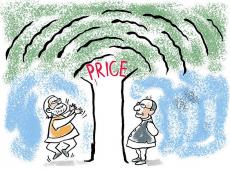
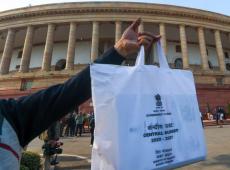
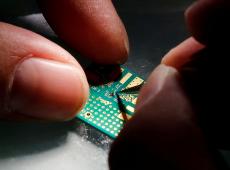
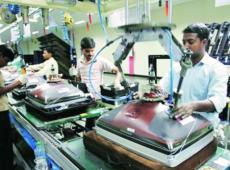


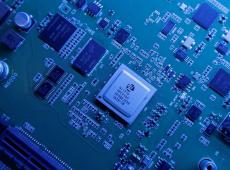
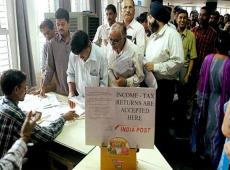
 © 2024 Rediff.com India Limited. All rights reserved.
© 2024 Rediff.com India Limited. All rights reserved.